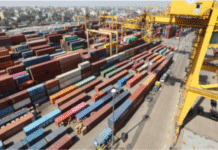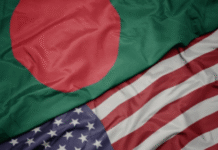
Foreign exchange reserves in Bangladesh could slip below $40 billion for the first time in nearly two years owing to regular import payments and a slowdown in remittance flow.
Bangladesh will have to settle import payments worth $1.96 billion with the Asian Clearing Union (ACU) next week. The reserve may fall down below $40 billion once the Bangladesh Bank adjusts the import payments.
Bangladesh’s foreign currency reserves stood at $41.98 billion on Wednesday in contrast to $46.15 billion in December last year as exports and remittance flow failed to keep pace with blistering import bills.
The ACU is an arrangement through which participating countries settle import payments for intra-regional transactions.
Bangladesh, Bhutan, India, Iran, the Maldives, Myanmar, Nepal, Pakistan and Sri Lanka are members of the Tehran-headquartered ACU. The BB has to make the payments every two months.
In Bangladesh, imports show no sign of abating, while remittances may decrease next week as usually seen after Eid festivals, bringing an adverse impact on the reserves, which have already taken a beating in recent months from the abnormally high commodity prices globally.
Experts say a further decline in the reserves will create additional pressure on the macro-economy, already under stress due to the higher imports and surging inflation.
This led Ahsan H Mansur, executive director of the Policy Research Institute of Bangladesh, to urge the government to keep the public well-informed about the situation.
“Consumption of petroleum oil and electricity will have to be reduced to tackle the ongoing situation. We have still time to address the issue.”
He thinks that there is no other scope but to stop the implementation of mega projects by using the own funds of the government.
Mansur advised the government to take up foreign loans aggressively from multilateral lenders such as the International Monetary Fund and the World Bank to implement mega projects.
Syed Mahbubur Rahman, managing director of Mutual Trust Bank, said that remittances would face sluggishness after Eid.
Remittances contracted in 2021-22, the first time in six years, as many remitters opted for the informal channels to send their money. The inflow stood at $21.03 billion.
The central bank is now injecting US dollars on a regular basis into the money market, helping banks settle import bills.
It supplied a record $7.62 billion in the last fiscal year of 2021-22 and $209 million in the current fiscal year.
Still, the BB has failed to stop the depreciation of the exchange rate of the local currency. The taka traded at Tk 93.45 to a dollar yesterday compared to Tk 84.80 a year ago.











